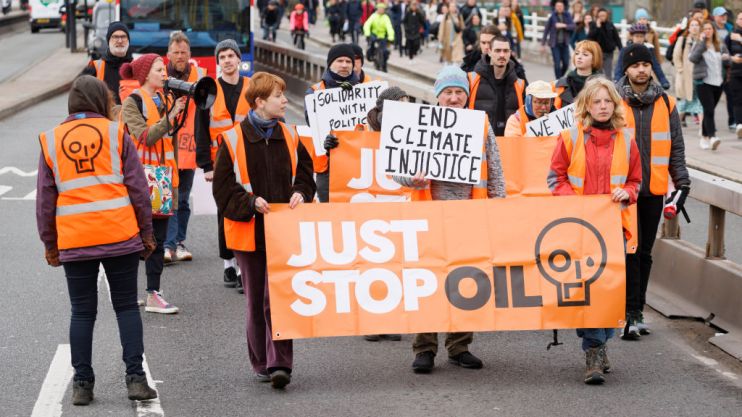Ignore the protests, the Conservatives are the true Just Stop Oil party

The feverish backlash to the government’s oil and gas announcements must have been catnip for Prime Minister Rishi Sunak, who flew off to California on holiday at the back end of last week having made, for him at least, all the right enemies.
Perhaps the viral takedown of his tailoring from a social media fashion guru was the only unwelcome rebuttal that came his way, after teaming up with energy security secretary Grant Shapps to unveil pledges for at least 100 new North Sea licences and two further carbon capture clusters last Monday.
Sunak was backing fossil fuels in a bid to strengthen the country’s energy security amid continued market volatility, which has wreaked havoc with wholesale costs.
Climate activists were stirred into such heated fury that Greenpeace protestors breached Sunak’s constituency home in Richmond, Yorkshire, to provocatively unfurl banners from its roof, while Labour’s shadow climate secretary Ed Miliband accused Sunak of “driving a coach and horses” through the country’s net zero commitments.
All of this has very much been in Sunak’s interest, with the Prime Minister eager to turn climate policies into a wedge issue ahead of the next election, in a bid to contrast issue his “realist” take on cutting emissions with Labour’s accelerated, and costly, timetable.
This can be seen with his order of a review into low traffic neighbourhoods, the extensive anti-ULEZ campaigning, and in frontbencher Michael Gove’s warnings against pushing for net zero becoming an environmental “crusade”.
Yet much of it is utterly presentational – as Sunak is, in fact, arguably the driving force behind the country’s green agenda.
Oil and gas sector suffers from Tory windfall tax
Sunak’s response chiefly consists of reviews and rhetoric, with the government still committed to its ban on new petrol and diesel vehicle sales by the end of the decade and the net zero target for 2050 still a safe and shared goal across all major parties.
While Shapps likes to present Labour as the political wing of Just Stop Oil, with Labour also not in favour of new licences being approved in the North Sea, no one has done more to jeopardise the UK’s production of black gold than the Conservatives – the party that has actually been in power for the past 13 years.
It is the Conservative government that brought in a windfall tax last year to harness the profits of oil and gas producers, which was then hiked and extended under serving Chancellor Jeremy Hunt to last six years, creating a 75 per cent levy for the North Sea.
This has contributed to a severe downgrading in the industry’s ambitions, with Total slashing £100m plans to work on an infill well on Elgin this year, Enquest planning to leave its Kraken field in the North Sea to “natural decline”, and Harbour Energy cutting jobs at its Aberdeen base alongside shifting investment to the US and South America.
These funding decisions come with banks toughening the terms of lending, with the windfall tax deemed to be a policy change rather than a temporary relief measure for energy bills due to its length and severity.
The Treasury has even admitted a subsequent softening of the levy with a price floor was not expected to kick in during the tax’s duration, with the government now only set to make changes to the investment regime from 2028.
Meanwhile, Sunak’s new licence pledges could take decades to come to fruition – assuming an industry still exists by then.
Figures from the North Sea Transition Authority this year indicate that investment will halve in British waters for oil and gas by the end of the decade, with the flagship Rosebank field the only major project potentially set for development – provided investment appetite survives a likely endless series of judicial reviews.
Policies, not posturing, are what matters
Trade association Brindex, which represents independent oil and gas players, fears the country’s “broader fiscal regime remains uncompetitive”,while Ithaca Energy told City A.M. that the “Energy Profits Levy in its current form continues to impact investment across the North Sea”.
There is no doubt the North Sea is an ageing, declining basin, that is less appealing to investors than rival markets due to its shrinking supplies, irrespective of the fiscal regime.
Any government, regardless of policy, would now be overseeing its phased decline and necessary shift to offshore wind, carbon capture and hydrogen.
Yet, domestic supplies still meet nearly half the UK’s consumption demand and are less environmentally damaging than alternatives, with nearly 20 per cent fewer carbon emissions than overseas options like LNG – a matter too important for clumsy energy legislation and posturing.
Today’s column is not a verdict on net zero, where an environmentally sound pro-growth argument exist for cutting carbon emissions and boosting the economy with green investment – alongside the real challenges for electrification and energy generation, which will require historical shifts in planning laws, foreign policy and consumption habits.
Instead, it is an attempt to expose the problem of presentation being confused with policy, and there is no more egregious example of this than the Tories’ criticisms of Just Stop Oil.
If oil and gas production collapse, it will be a consequence of Conservative policies agreed in the cabinet office, not protestors.